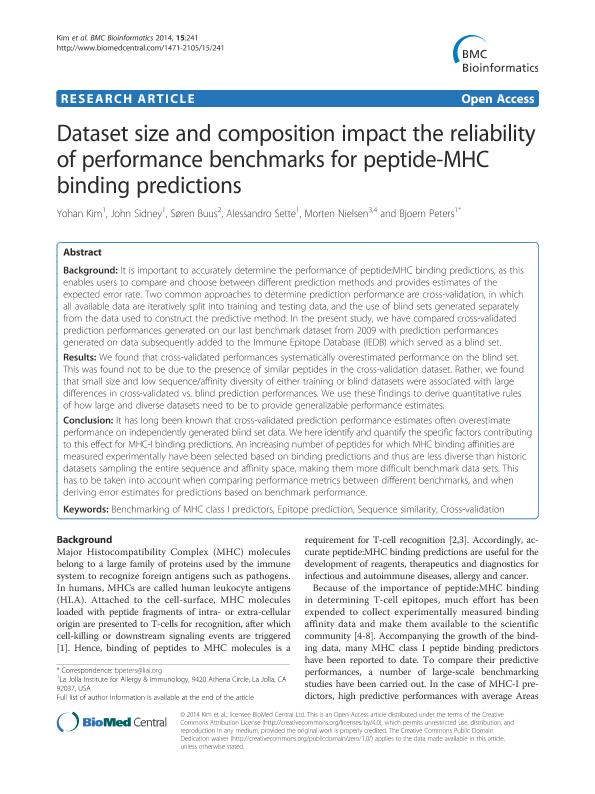Mostrar el registro sencillo del ítem
dc.contributor.author
Kim, Yohan

dc.contributor.author
Sidney, John

dc.contributor.author
Buus, Søren

dc.contributor.author
Sette, Alessandro

dc.contributor.author
Nielsen, Morten

dc.contributor.author
Peters, Bjoern

dc.date.available
2017-06-12T15:50:21Z
dc.date.issued
2014-07
dc.identifier.citation
Kim, Yohan; Sidney, John; Buus, Søren; Sette, Alessandro; Nielsen, Morten; et al.; Dataset size and composition impact the reliability of performance benchmarks for peptide-MHC binding predictions; BioMed Central; Bmc Bioinformatics; 15; 241; 7-2014; 1-9
dc.identifier.issn
1471-2105
dc.identifier.uri
http://hdl.handle.net/11336/17977
dc.description.abstract
BACKGROUND: It is important to accurately determine the performance of peptide:MHC binding predictions, as this enables users to compare and choose between different prediction methods and provides estimates of the expected error rate. Two common approaches to determine prediction performance are cross-validation, in which all available data are iteratively split into training and testing data, and the use of blind sets generated separately from the data used to construct the predictive method. In the present study, we have compared cross-validated prediction performances generated on our last benchmark dataset from 2009 with prediction performances generated on data subsequently added to the Immune Epitope Database (IEDB) which served as a blind set. RESULTS: We found that cross-validated performances systematically overestimated performance on the blind set. This was found not to be due to the presence of similar peptides in the cross-validation dataset. Rather, we found that small size and low sequence/affinity diversity of either training or blind datasets were associated with large differences in cross-validated vs. blind prediction performances. We use these findings to derive quantitative rules of how large and diverse datasets need to be to provide generalizable performance estimates. CONCLUSION: It has long been known that cross-validated prediction performance estimates often overestimate performance on independently generated blind set data. We here identify and quantify the specific factors contributing to this effect for MHC-I binding predictions. An increasing number of peptides for which MHC binding affinities are measured experimentally have been selected based on binding predictions and thus are less diverse than historic datasets sampling the entire sequence and affinity space, making them more difficult benchmark data sets. This has to be taken into account when comparing performance metrics between different benchmarks, and when deriving error estimates for predictions based on benchmark performance.
dc.format
application/pdf
dc.language.iso
eng
dc.publisher
BioMed Central

dc.rights
info:eu-repo/semantics/openAccess
dc.rights.uri
https://creativecommons.org/licenses/by/2.5/ar/
dc.subject
Benchmarking of Mhc Class I Predictors
dc.subject
Epitope Prediction
dc.subject
Sequence Similarity
dc.subject
Cross-Validation
dc.subject.classification
Otras Ciencias de la Computación e Información

dc.subject.classification
Ciencias de la Computación e Información

dc.subject.classification
CIENCIAS NATURALES Y EXACTAS

dc.title
Dataset size and composition impact the reliability of performance benchmarks for peptide-MHC binding predictions
dc.type
info:eu-repo/semantics/article
dc.type
info:ar-repo/semantics/artículo
dc.type
info:eu-repo/semantics/publishedVersion
dc.date.updated
2017-06-09T15:01:05Z
dc.journal.volume
15
dc.journal.number
241
dc.journal.pagination
1-9
dc.journal.pais
Reino Unido

dc.journal.ciudad
Londres
dc.description.fil
Fil: Kim, Yohan. La Jolla Institute for Allergy and Immunology; Estados Unidos
dc.description.fil
Fil: Sidney, John. La Jolla Institute for Allergy and Immunology; Estados Unidos
dc.description.fil
Fil: Buus, Søren. Universidad de Copenhagen; Dinamarca
dc.description.fil
Fil: Sette, Alessandro. La Jolla Institute for Allergy and Immunology; Estados Unidos
dc.description.fil
Fil: Nielsen, Morten. Consejo Nacional de Investigaciones Científicas y Técnicas. Centro Científico Tecnológico Conicet - La Plata. Instituto de Investigaciones Biotecnológicas. Universidad Nacional de San Martín. Instituto de Investigaciones Biotecnológicas; Argentina. Technical University of Denmark; Dinamarca
dc.description.fil
Fil: Peters, Bjoern. La Jolla Institute for Allergy and Immunology; Estados Unidos
dc.journal.title
Bmc Bioinformatics

dc.relation.alternativeid
info:eu-repo/semantics/altIdentifier/doi/http://dx.doi.org/10.1186/1471-2105-15-241
dc.relation.alternativeid
info:eu-repo/semantics/altIdentifier/url/https://bmcbioinformatics.biomedcentral.com/articles/10.1186/1471-2105-15-241
Archivos asociados
